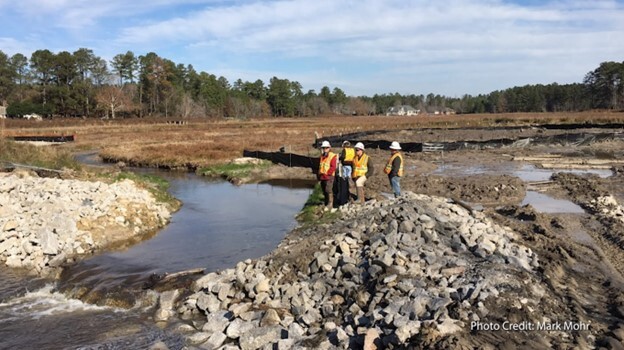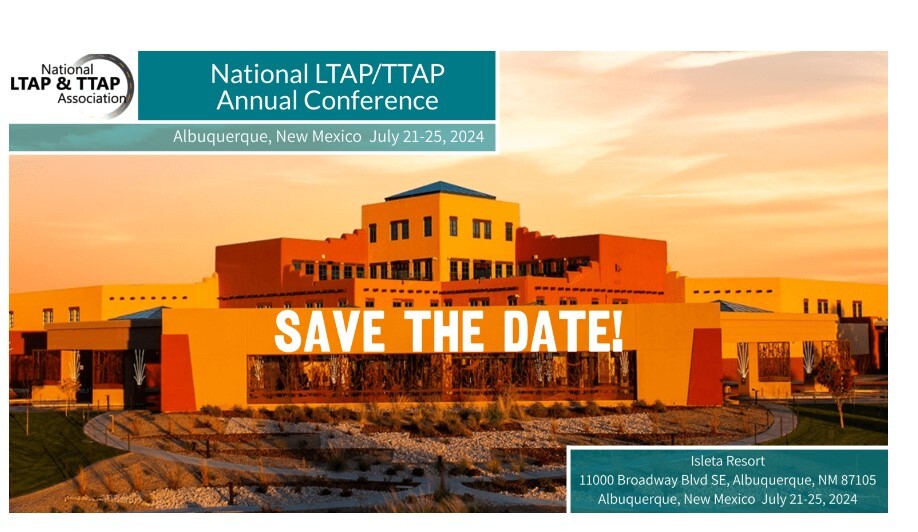Local Aid Support Newsletter Winter 2024U.S. DOT Federal Highway Administration sent this bulletin at 02/22/2024 04:46 PM EST  13th Edition
Winter 2024
13th Edition
Winter 2024
Welcome!
Bipartisan Infrastructure Law (BIL) and Federal Requirements Guidance for Local & Tribal Agencies
The Federal Highway Administration is pleased to offer this instructor led on-demand web-based training to assist local and Tribal agencies with applying for transportation funding under the Bipartisan Infrastructure Law. This introductory self-paced training provides an overview of funding opportunities, the discretionary grant process, consideration of federal project delivery requirements, and helpful tools and resources that local and Tribal agencies should consider when preparing and delivering an infrastructure project under the Bipartisan Infrastructure Law. This training and resources are also available in full recorded webinar format via the FHWA Office of Technical Services, Local Aid Support website.
FHWA Local Aid Support is taking nominations for the 2024 Build a Better Mousetrap National Competition
Build a Better Mousetrap is a national competition that recognizes local and tribal agencies who use innovative solutions to address challenges in their transportation programs. For 2023, the Federal Highway Administration received 53 nominations with four winners selected. Be sure to download the 2023 booklet for information on all 53 nominations. 2024 nominations are due June 7. Please work with your state's LTAP or TTAP Center on the submissions. For more information on Build a Better Mousetrap, visit: Website 2023 Video
"Night Vision" Traffic Signal CabinetCity of Knoxville, TN
Courtesy of the City of Knoxville for Build a Better Mousetrap Traffic Signal Cabinets throughout the country can malfunction and cause a safety issue at intersections. Maintenance of these cabinets is challenging because of the various cabinet components including the complicated wiring packed into a tight space. However, the City of Knoxville, Tennessee felt maintenance of the cabinets were even more challenging during the night hours because of the less-than-ideal lighting conditions. The service workers needed some additional assistance being able to quickly see inside the cabinets. As a solution, the City of Knoxville decided they would experiment with painting the inside of the cabinets white to create a brighter contrast with the lighting sources used by the technicians such as headlamps or flashlights. The City went a step further and installed LED strips inside the cabinet so that they would light up once the cabinet door is opened. "The only challenge was the strategic placement of the LED light strips. They needed to be out of the way of the other equipment," says Airton G. Kohls, a Research Assistant with the University of Tennessee. The internally painted cabinets not only provided improved lighting conditions for the technicians, but they also minimized the amount of time they spent troubleshooting the service calls. Airton says, "This enhancement helped decrease the time a technician needs to setup and takedown equipment when working on a traffic cabinet at night. This innovation did have a supplemental effect as it lowered the internal temperature by 30 degrees. Traffic cabinets internal temperatures in east Tennessee can get well over 170 degrees." Airton encourages others to not hesitate when it comes to stepping outside the box to solve problems, "Even the smallest of improvements like this can save time and help with making the work area safer." For more information or questions, contact Airton G. Kohls at 865-974-0298 or akohls@utk.edu. The Culvert InspectorDes Moines County, IA
Courtesy of Des Moines County, IA for Build a Better Mousetrap Des Moines County, Iowa needed to improve their processes for inspecting culverts. Some culverts were too small for a person to crawl through, so they had to use a camera attached to a cord to run into the pipes to check for issues and determine fix solutions. However, this same method was not suitable for the larger pipes as the camera would fall into the water. Their solution was to purchase a remote-control car from a local store and attach a camera and flashlight to the car. "We were skeptical about how well we were going to see after running the camera through the pipe. Were we going to be able to see the bottom, top, and sides of the pipe or just the bottom and may miss some of the portion of the pipe? At the end, we were pleased how well it did work and what we were able to see," says Devon Bell, the County’s Assistant Engineer. The camera links to a mobile app allowing the County to see inside the pipe as they steered the car. Zip ties were used to keep the camera in place and duct tape was used for attaching the flashlight. Devon says the biggest challenge was figuring out a way to keep the camera attached to the car. Cost to implement the innovation was $510. "This solution saves taxpayer money because we get a true visual of the pipe’s condition, which helps us determine whether a pipe needs to be replaced instead of assuming a pipe needs to be replaced," says Devon. "This has been an awesome tool for us to use in the field, we are seeing things that we have not been able to see at low cost." Devon’s advice for encouraging the use of innovative solutions, "if you don’t at least attempt something, you will never know if it will work out or not. If you do attempt something, at least you will know if it is right or wrong." For more information on this innovative solution, contact Devon Bell at 319-753-8241. A Suite of Apps to Improve Project DeliverySouth Carolina DOT
Courtesy of South Carolina Dept. of Transportation for Build a Better Mousetrap The South Carolina Department of Transportation’s Environmental Services Office (SCDOT’s ESO) identified three areas that have significant effect on its ability to deliver projects on time and on budget: 1) inconsistent permit application submittals among consultants that led to approval delays, 2) inability to consistently identify "red flags" early in the project development process, and 3) lack of mitigation credit coverage. To address these issues, the SCDOT’s ESO teamed up with a nonprofit organization, the South Carolina Mitigation Association to develop three web applications and two web-based smart forms as part of a research project: 1) the Mitigation Forecasting Tool (MFT) aims to reduce the number of projects at risk due to the lack of wetland and stream mitigation bank credit coverage and the number of projects at risk due to low wetland and stream credit availability; 2) the Project Screening Tool (PST 2.0) aims to ensure that SCDOT projects are developed in a way that avoids, minimizes, and mitigates impacts to South Carolina’s natural and human environment; 3) the Jurisdictional Determination (JD) webapp aims to facilitate the creation of maps for the JD application; 4) the JD smart form works in conjunction with the JD webapp to produce the JD application package; and 5) the Section 404 eâ€permit aims to standardize permit submittals in terms of what information to include, how the documents should be presented, where in the package each document should be placed, and how permit drawings should be presented. "Our initial development used open-source applications, which did not comply with SCDOT’s IT standards. We had to redo the development using compliant software using ESRI’s suite of products, which met SCDOT’s needs," says Daniel Cook, Innovation Manager with the South Carolina DOT. According to Daniel, the innovation saves time and increases productivity by saving four-to-six hours per project screening. The suite of apps has also strengthened relationships and improved transparency between SCDOT and the mitigation banking community. "Being transparent on impacts has assisted in removing risk as it relates to project delivery. This innovation has helped reduce project costs and has assisted in streamlining project delivery to the motoring public of South Carolina." Daniel says the innovation is continually being updated with SCDOT projects and now SCDOT is calibrating the forecast model based off Eco-Regions. This calibration and project update should increase accuracy of our model and more accurately define wetland and stream impacts at the 8-digit HUC level. For more information, contact Daniel Cook at 803-737-6627 or cookdc@scdot.org  Project Photo Courtesy of the South Carolina Dept. of Transportation Notice Build a Better Mousetrap is disseminated under the sponsorship of the U.S. Department of Transportation in the interest of information exchange. The U.S. Government assumes no liability for the use of the information. The U.S. Government does not endorse products or manufacturers. Trademarks or manufacturers’ names appear in this report only because they are considered essential to the objective of the information provided.
Remarkable Growth Generates Training Success in North CarolinaNorth Carolina Local Technical Assistance Program (LTAP) Center
Photo courtesy of the NC LTAP Center The NCLTAP team at North Carolina State University has experienced remarkable growth in terms of personnel, course offerings, and student enrollment. A notable achievement was the successful launch of the Pavement Preservation class in 2023, which, despite being the inaugural session, was a full house! Attendees praised the class for its informative and educational content, with feedback ranging from describing it as "professional and supportive" to offering ideas for cost-efficient practices. Positive responses and insights from a comprehensive 2023 Needs Assessment survey told the NCLTAP team to expand: and we are! We’re introducing two new one-day classes in 2024; the first is dedicated to Pipe Installation, delving into the work of installing and maintaining functional and sustainable pipelines with a unique focus on the importance of communication during this delicate and dangerous work. The second addition is Grants 101 Workshop, focusing on grant writing, funding research and grant lifecycles, and creating awareness about opportunities including grants available as part of the Bipartisan Infrastructure Law. Our growth is always focused on the needs of our public works professionals, ensuring success across the board for both employers and employees. As the world of public works continues to grow and change as our cities and counties flourish, we will continue to be a partner for our locals and ensure we provide high-quality educational classes for professionals in their fields. For more information on the NC LTAP's Training Program, contact Director Kate Davison at kbdaviso@ncsu.edu Transportation Takeaway Video Series: A New Way to TrainMassachusetts Local Technical Assistance Program (LTAP) Center
Photo: Courtesy of UMass LTAP Center Incorporating new online video animation software, the Massachusetts LTAP Center and the University of Massachusetts developed a new Transportation Terminology outreach video series. The short two-minute videos are informative and entertaining segments educating the general public on transportation terms and concepts being heard and seen in the news. Since their initial launch in November 2022, more than eight videos have been released. In addition, promotional Baystate Roads videos were created for virtual class waiting rooms on the Zoom platform. Waiting room videos elevate audience awareness of the many classes and resources available to support the cities and towns across the Commonwealth. A custom video was also created to play at our remote office facility at Westover Airforce Base to welcome class attendees and visitors. Here is a link to the original series Transportation Take-Aways For more information, contact Stephanie Cottrell with the UMASS LTAP Center at scottrell@umass.edu.
FHWA Meets with TTAP Directors
The FHWA's Office of Tribal Transportation and the Office of Local Aid Support recently met with Tribal Technical Assistance Program Directors at the USDOT headquarters in Washington D.C. The purpose of the meeting was to develop strategies for addressing challenges in providing training, technical assistance, technology transfer and communication services in the seven regions. The meeting was very productive with more Peer Exchanges planned throughout this first year. Western TTAP Center UpdateThe FHWA Local Aid Support team is working to re-establish the Western TTAP Center, which covers AZ, CA, HI, NV, and UT. A Notice of Funding Opportunity was released with decision on the new center coming soon. New Online Training Course Coming Soon!The Local Aid Support team in collaboration with the FHWA Office of Tribal Transportation are developing the first Tribal Transportation Program (TTP) - 101. The course will provide an overview of Tribal Transportation Topics that we heard are important and can assist with managing Tribal transportation programs. More details coming soon.
Cajun and Creole e-Ticketing Cuisine in Louisiana!Submitted by: Bryan Cawley, Construction Engineer, FHWA Resource Center
The Louisiana Department of Transportation and Development (LaDOTD) recognized many of the flavor enhancements of e-ticketing early in the implementation process. Those enhancements were less paper, more time in the field, and less trips to the office. The LaDOTD started early in 2021 identifying existing recipes for success with e-Ticketing. In particular, they reviewed the Iowa DOT and AASHTO specifications. Based on these two examples and coordination with Louisiana solution providers, materials providers, and contractor special provision to pilot e-Ticketing in Louisiana was developed. Pilot projects advanced in 2022 were for concrete and asphalt paving projects, using differing solution provider technologies. In 2023 several additional asphalt paving projects were piloted. Figure 1 presents e-Ticketing being used in Louisiana. In review of the pilots, the e-Tickets were filled out and easier to read than the paper tickets of the past. It was also observed that some of the plants were entering data into the generic text fields, such as lot numbers, project names, and materials name. This non requested additional information was a great help to the field inspectors. Other benefits identified were improved data management, GPS and timestamp capturing, and greater transparence of material from the plan. Some areas for improvement included trucks being rejected at the plant because of reported issues on e-Tickets, multiple software solution providers and interconnectivity, unique data cell identification, and some users thought it was more work. To work with these areas for improvement, LaDOTD provided education to inspectors and industry regarding the e-Ticketing application and how it performs the calculations. The LaDOTD also began working with solution providers to identify a common data format and ticket appearance, regardless to the solution providers technology. With the lessons learned in the pilots and changes embraced, the LaDOTD is developing of a specification that will be incorporated into projects being advertised in 2024. In addition, LaDOTD had worked with a solution provider for a license to access their e-Ticketing platform. Beyond 2024, LaDOTD is looking to have the e-Ticketing technology help with tracking and validation of mitigation efforts associated with alkali silica reactivity with aggregates in concrete. If you would like to learn about LaDOTD’s accelerated deployment Sourceof e-Ticketing, please contact Mr. Patrick Icenogle, P.E., LADOTD e-Construction Engineer. If you would like to learn more about FHWA’s efforts with e-Ticketing please contact Ms. Kathryn Weisner, P.E., FHWA Construction and Contracts Administration Engineer. New Product Alert: From the FHWA Office of SafetyRural Roads| Proven Safety Countermeasures (PSCs) in Rural Communities (FHWA-SA-24-005) is a new compendium of 12 PSCs suited for rural roads. This will be a helpful tool for communities looking to save lives by focusing on roadway departure, intersections, ped/bike, or speed management. Each countermeasure includes an overview, considerations for rural applications, crash reduction effectiveness, and case studies. The guide also features a useful reference table that allows practitioners to quickly evaluate the PSC based on other factors, like relative cost, service life, and how it aligns with the Safe System Design Hierarchy. | Phillip Bobitz Bipartisan Infrastructure Law (BIL) Competitive Grant Programs: https://www.fhwa.dot.gov/bipartisan-infrastructure-law/grant_programs.cfm
Local Aid Support Attends NLTAPA Winter Business Meeting
Courtesy of FHWA The National Local and Tribal Technical Assistance Program Association or NLTAPA recently held their annual Winter Business Meeting. Attendees were in-person and on video. The Local Aid Support team provided updates on FHWA initiatives, new training, and other information needed for the new year. The group regularly meets to provide updates on activities in their States. They also develop strategies for program development and new training opportunities to implement throughout the year. NLTAPA meets again in July for the annual conference.  Local Aid Support Team Shared information on Build a Better Mousetrap during the Annual Transportation Research Board Conference
Courtesy of FHWA The Local Aid Support was joined by Build a Better Mousetrap Winners during the annual Transportation Research Board Conference in Washington D.C. The Confederated Tribes and Bands of the Yakama Nation won the 2023 Innovative Project Award for the Mobile Unit Sensing Traffic Device. It collects and stores data, making it easier to analyze rural road users and make safety improvements based on the information. It was exciting to see them and have them visit our booth. Local Aid Support Team Said Goodbye to Joe Conway
The Local Aid Support Team recently said goodbye to Director Joe Conway. He retired from FHWA at the end of December. His leadership helped the FHWA improve its relationship with the LTAP Centers while re-establishing the TTAP Centers. Everyone who has worked with Joe will miss his wealth of knowledge on everything LTAP/TTAP and his ability to connect with the stakeholders. We wish Joe well in his retirement!
The Road to Success - Available Online Training
Additional FHWA TrainingUPCOMING EVENTS March 2024 March 25, 3:30 - 4:30 pm ET - Innovation in Project Delivery Forum: Progressive Design Build Washington State DOT, Mr. Ricky Bhalla and Mr. Jon Keeth May 2024 May 20, 3:30 - 4:30 pm ET - Innovation in Project Delivery Forum: Value Engineering with Texas DOT, Ms. Jane Landquist Upcoming ConferencesApril 15 - 18, 2024 Stay connected with FHWA on YouTube |
|||||||||||||||||||||||||||||||